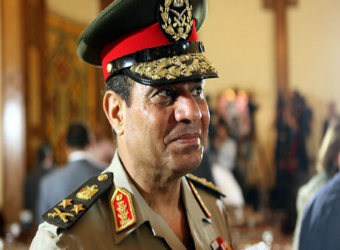Egypt’s political transition was pitched into uncertainty on Sunday when a draft constitution was amended to allow a presidential election to be held before parliamentary polls, indicating a potential change in the army’s roadmap.
The roadmap unveiled when the military ousted Islamist President Mohamed Morsi in July said a parliamentary election should take place before the presidential one.
But the draft finalized on Sunday by the 50-member constituent assembly avoids saying which vote should happen first, leaving the decision up to President Adly Mansour, seen as a front for army rule since he was installed to head the interim administration.
The draft also says the “election procedures” must start within six months of the constitution’s ratification, meaning Egypt may not have an elected president and parliament until the second half of next year.
A major milestone in Egypt’s political roadmap, the constitution must be approved in a referendum expected this month or next. Amr Moussa, chairman of the constituent assembly, said the draft constitution would be handed to Mansour on Tuesday.
Moussa, former Arab League secretary general, was a candidate in the presidential election won by Morsi last year.
The draft reflects how the balance of power has shifted in Egypt since the secular-minded generals ousted Morsi, the country’s first freely elected head of state, after mass protests against him and the Muslim Brotherhood.
The new constitution could lead to an outright ban on Islamist parties and strengthens the political grip of the already powerful military establishment that has put itself squarely back at the heart of power since toppling Morsi.
The assembly finished voting on the draft after talks on the order of next year’s elections stretched late into Sunday night.
The changes follow debate fuelled by concern that weak secular parties are not ready for parliamentary elections, sources familiar with the discussions have said.
Seeing army chief Abdel Fattah al-Sisi as the front-runner for president, some assembly members wanted the presidential election held before legislative polls or even at the same time so that a strong presidential candidate can forge an electoral alliance for the parliamentary race.
SISI KEEPS EGYPT GUESSING
Sisi led the July 3 overthrow of Morsi and is widely seen as the lead candidate for the presidency.
While Brotherhood sympathizers hold him responsible for the deaths of hundreds of Morsi supporters killed in a crackdown on the movement, other Egyptians see him as the kind of strong man needed to restore stability after three years of turmoil.
Sisi has been lionized by state media since toppling Morsi.
As they wait for Sisi to make his intentions clear, none of the candidates defeated by Morsi in last year’s presidential election, such as Moussa, have declared they will run. However, Hamdeen Sabahi, a leftist who came third, has strongly hinted he would like to.
A spokeswoman for his Popular Current, Heba Yassin, said holding the presidential election ahead of the parliamentary vote would meet the demands of people who took to the streets against Morsi on June 30 to demand an early presidential vote.
Morsi’s Brotherhood won all elections after President Hosni Mubarak’s downfall in 2011, drawing on its position as Egypt’s best-organized party to defeat leftists and liberals in parliamentary and presidential polls.
But the state has cracked down hard on the Brotherhood since Morsi’s ouster, arresting thousands of its supporters including many of its leaders. The group says it wants nothing to do with the army-planned transition.
The draft constitution widens the already broad privileges enjoyed by the army by requiring the approval of the Supreme Council of the Armed Forces for the choice of a defense minister to serve for two full presidential terms from the moment the document is ratified.
It does not indicate how the minister of defense could be sacked or who has the authority to fire him.
It also allows the military to try civilians in military courts – a holdover from previous constitutions that is strongly opposed by democracy activists. The draft does, however, specify the crimes for which a civilian can be tried by the military.
The constitution will replace one signed into law by Morsi last year after it was passed in a referendum. The new text strips out Islamist-inspired additions introduced by the Islamist-dominated assembly that drafted it.
TEARGAS FLIES IN TAHRIR SQUARE
Morsi’s fall set off the bloodiest bout of internal strife in Egypt’s modern history.
Armed attacks on the security forces have become commonplace, and some 200 policemen and soldiers have been killed in what the government casts as a war on terrorism waged by Islamist militants. The Brotherhood says it is peacefully resisting the army takeover.
In a reminder of the simmering tension, security forces fired teargas in Cairo’s Tahrir Square to disperse anti-government protesters. It appeared to be the biggest protest by Brotherhood supporters in Tahrir Square since Morsi’s downfall.
“The people want to topple the regime,” chanted several hundred protesters. “With our blood and souls we sacrifice for you, Islam,” chanted some. One scaled a lamp post to hang a picture of Morsi.
Others flashed the four-finger hand sign denoting sympathy with the hundreds of Morsi supporters shot dead by the security forces when they broke up their Cairo sit-ins on August 14.
Army vehicles moved in to drive the demonstrators away and later sealed off the square completely. Some passersby shouted abuse at the protesters, others waved in support. Earlier, protesters set a police truck ablaze near Cairo University.
The government says it is determined to implement a law passed last week that heavily restricts protests. Criticized by the United States, the law has hardened fears of pro-democracy campaigners about the future of political freedoms in Egypt.
Ahmed Maher, one of two leading secular activists detained for calling protests in defiance of the law, was released on Sunday. The other, Alaa Abdel Fattah, was ordered detained for a further 15 days. Both are symbols of the historic 2011 uprising that led to Mubarak’s downfall.
Source: Reuters



